- Home
- Matthew Fitzsimmons
Poisonfeather (The Gibson Vaughn Series Book 2)
Poisonfeather (The Gibson Vaughn Series Book 2) Read online
PRAISE FOR THE SHORT DROP
“FitzSimmons has come up with a doozy of a sociopath.”
—Washington Post
“This live-wire debut begins with a promising lead in the long-ago disappearance of the vice president’s daughter, then doubles down with tangled conspiracies, duplicitous politicians, and a disgraced hacker hankering for redemption . . . Hang on and enjoy the ride.”
—People
“Writing with swift efficiency, FitzSimmons shows why the stakes are high, the heroes suitably tarnished, and the bad guys a pleasure to foil.”
—Kirkus Reviews
“With a complex plot, layered on top of unexpected emotional depth, The Short Drop is a wonderful surprise on every level . . . This is much more than a solid debut, it’s proof that FitzSimmons has what it takes.”
—Amazon.com, An Amazon Best Book of December 2015
“Beyond exceptional. Matthew FitzSimmons is the real deal.”
—Andrew Peterson, author of the bestselling Nathan McBride series
“The Short Drop is an adrenaline-fueled thriller that has it all—political intrigue, murder, and suspense. Matthew FitzSimmons weaves a clever plot and deftly leads the reader on a rapid ride to an explosive end.”
—Robert Dugoni, bestselling author of My Sister’s Grave
ALSO BY MATTHEW FITZSIMMONS
The Short Drop
This is a work of fiction. Names, characters, organizations, places, events, and incidents are either products of the author’s imagination or are used fictitiously.
Text copyright © 2016 Matthew FitzSimmons
All rights reserved.
No part of this work may be reproduced, or stored in a retrieval system, or transmitted in any form or by any means, electronic, mechanical, photocopying, recording, or otherwise, without express written permission of the publisher.
Published by Thomas & Mercer, Seattle
www.apub.com
Amazon, the Amazon logo, and Thomas & Mercer are trademarks of Amazon.com, Inc., or its affiliates.
ISBN-13: 9781503934276 (paperback)
ISBN-10: 1503934276 (paperback)
ISBN-13: 9781503939295 (hardcover)
ISBN-10: 1503939294 (hardcover)
Cover design by Rex Bonomelli
For my friend Mike Tyner, without whom there’d be no Gibson Vaughn.
CONTENTS
THE HUBRIS
CHAPTER ONE
CHAPTER TWO
CHAPTER THREE
CHAPTER FOUR
CHAPTER FIVE
CHAPTER SIX
CHAPTER SEVEN
CHAPTER EIGHT
CHAPTER NINE
CHAPTER TEN
CHAPTER ELEVEN
CHAPTER TWELVE
CHAPTER THIRTEEN
CHAPTER FOURTEEN
CHAPTER FIFTEEN
CHAPTER SIXTEEN
CHAPTER SEVENTEEN
THE COLD ROCK
CHAPTER EIGHTEEN
CHAPTER NINETEEN
CHAPTER TWENTY
CHAPTER TWENTY-ONE
CHAPTER TWENTY-TWO
CHAPTER TWENTY-THREE
CHAPTER TWENTY-FOUR
CHAPTER TWENTY-FIVE
CHAPTER TWENTY-SIX
CHAPTER TWENTY-SEVEN
CHAPTER TWENTY-EIGHT
CHAPTER TWENTY-NINE
CHAPTER THIRTY
CHAPTER THIRTY-ONE
CHAPTER THIRTY-TWO
CHAPTER THIRTY-THREE
CHAPTER THIRTY-FOUR
CHAPTER THIRTY-FIVE
THE GIANT, CRAZY BIRD
CHAPTER THIRTY-SIX
CHAPTER THIRTY-SEVEN
CHAPTER THIRTY-EIGHT
CHAPTER THIRTY-NINE
CHAPTER FORTY
CHAPTER FORTY-ONE
CHAPTER FORTY-TWO
CHAPTER FORTY-THREE
CHAPTER FORTY-FOUR
ACKNOWLEDGMENTS
ABOUT THE AUTHOR
THE HUBRIS
But this is what you pay, Prometheus, for that tongue of yours which talked so high and haughty: you are not yet humble; still you do not yield to your misfortunes, and you wish, indeed, to add some more to them.
—Aeschylus, Prometheus Bound
CHAPTER ONE
The lights thudded to life in cavernous sweeps of fluorescence. All around him, Merrick heard the sound of men waking against their will. The groans of ancient bedsprings. Conversations, halted the night before at lights-out, picked up where they’d left off as though mere seconds had passed. Easy enough to resume because they were the same banal conversations as the morning before and the morning before that, stretching back the eight years Merrick had been waking to them.
A finite number of topics existed in prison—life before, life during, and the promise of a better life after. Enemies and friends, women, visitors, commissary, and the sorry state of the food. It didn’t take long to hear them all, and from that point forward it was only variations on a theme. Inmates came and went, but the conversations would go on forever. Handed down, mouth to ear, for generations of convicts yet to come. As if the conversations were the only true residents of a prison, the inmates merely transient voices mouthing words first spoken long before. Or so Charles Merrick would be happy to imagine in 142 days, when he put Niobe Federal Prison behind him forever.
Merrick swung his feet out of bed and directly into his flip-flops so that his feet never touched the floor of this detestable place. He made his bunk in four economical, practiced movements. The coarse wool blanket wasn’t fit for a dog. Certainly not Morgan—his King Charles spaniel, who had passed while he was inside. He missed that animal: the only loyal creature that he had ever known.
The guards moved through the dormitory, taking the seven a.m. count. They also took count at three and five a.m. It was the hardest part of prison for him—having his sleep interrupted by these feebleminded drones with their little hand clickers because the idea of keeping count in their heads was risible. High-school graduates unqualified even to work in the mail room at Merrick Capital.
“Ready for your big day, Cinderella?”
The guards had been hectoring him for weeks. Ever since the warden had approved the interview, Merrick had thought of little else. He hadn’t had a visitor other than his lawyer in years, so forgive him for being excited about it. Guards and inmates alike had mocked him endlessly like jealous children, but he was in far too good a mood to let it bother him today.
The moment the guards sounded the all clear, Merrick hurried for the showers. He would have run if allowed. Ordinarily, he never rushed to get anywhere; around every corner lay more prison, so what was the point? But today he wanted to be first in line, unwilling to risk the hot water running out again. After his shower, Merrick shaved carefully and combed his thick blond hair into its proper shape. It showed more gray than when he’d arrived at Niobe Federal Prison, but he still had it, and that’s what counted. If anything, he looked better today. The grueling pace at Merrick Capital had taken a toll on his health and on his midsection. It had taken prison for him to discover a love of exercise. Pumping iron, just like a real convict.
The cheap razor nicked him below the ear, and he dabbed at it with a shred of toilet paper. How he missed his old marble countertop of expensive toiletries. Securing even a sample vial of his preferred cologne had taken serious wheeling and dealing. He’d sacrificed a month’s commissary to have it smuggled in for today. He unscrewed the cap and knew immediately that it had been worth it. A generous dab on his clavicle and three, no, four, dabs on the inside of his left wrist—it would take a little extra to mask the stenc
h of this place. He rubbed his wrists together and admired himself in the mirror.
A passing guard caught a whiff and pulled up short. “What the hell is that smell, inmate?”
“Chanel’s Pour Monsieur,” Merrick said.
“Pour Monsieur?” the guard said, mimicking him in a bad French accent. “Well, you smell like a library’s abortion. Now hurry up, Cinderella, before you miss the ball.”
Merrick pulled on his unflattering prison-issue jumpsuit and tried to tailor it in the mirror, to little effect. He’d requested his trial suit to wear for the interview and had been laughed out of the warden’s office. Probably wouldn’t have fit him anyway, because he was far trimmer than when he’d arrived. He would need new ones—fifteen or twenty to start—and hoped his man on Savile Row hadn’t retired. One didn’t go changing tailors willy-nilly.
At breakfast, Merrick sat alone and picked over what passed for scrambled eggs inside. He didn’t like the idea of going into an interview unprepared, but the magazine had rebuffed his request for the questions in advance. As the managing partner of Merrick Capital, he’d given two or three interviews a week. Journalists had lined up for an audience, and his public relations team had prescreened the questions, scripting the meeting to show the Charles Merrick brand in the best possible light.
It would be a new experience walking into an interview unprepared, but Finance was a fine, professional magazine with a first-class pedigree. They would surely send someone competent. He didn’t know this Lydia Malkin woman, but she would get her money’s worth. He was feeling expansive, and the idea of talking appealed to him. Real talk. It had been so long since anyone had asked him a question that required anything of him.
When the hour of his interview arrived, a guard led Merrick into one of the cramped legal counseling rooms. It was bare bones, empty but for a long table and uncomfortable metal chairs. He’d been in it, or one like it, innumerable times. At the table sat a woman about the age of his daughter—maybe twenty-five? She was scribbling notes on a legal pad. Not all that attractive, even if he were being charitable. Probably an intern sent along to get some experience in the field. Fine, fine. Two women were always better than one.
She put down her pen and stood to greet him. “It’s good to meet you, Mr. Merrick.”
“Will she be long?”
“Excuse me?”
“Lydia Malkin. Will she be long? I don’t know how long the guards will give us. They can be . . . unhelpful,” he said as though describing the service at a hotel.
“I am Lydia Malkin.”
She held out her hand. He looked at it and felt his blood pressure rising at the thought that someone had sent this child to interview him.
“You’re a reporter with Finance?”
“I am, yes.”
“What are you? Twenty? Have you even finished college?”
“I’m twenty-six. I have a master’s in journalism from Northwestern.”
“Do you even know who I am?”
“You’re Charles Merrick.”
“Good for you. But I know full well that Finance does not hand twenty-six-year-olds cover interviews.”
She looked at him with surprise. “I’m sorry if there’s been some miscommunication. This isn’t for the cover.”
“I beg your pardon?”
“This is a little profile piece. ‘Where is he now?’ That sort of thing. Since you’re getting out soon.”
“A profile piece? Is Peter still the editor?”
“Peter Moynihan is the editor,” she said in a weary tone that irritated Merrick.
“And he thought it would be a good idea to do a . . . how did you put it? A ‘little profile piece’ on me?”
“Actually Peter wasn’t all that big on the idea. Initially.”
“Initially.”
“I convinced him.”
“Well, thank you so very much,” Merrick said. “For being my champion.”
“Perhaps I should go.”
He watched her gather up the materials that she’d laid out on the table. In the old days, he would have laughed a reporter out of his office for trying such a transparent tactic. He wanted badly to let her leave Niobe Prison disappointed and empty-handed, but he stopped her because it would have hurt him far worse.
“Why weren’t they interested?”
She paused and looked him over, held his gaze steadily, assessing him confidently. He didn’t care for it but forced a smile. Much as he disliked to admit it, he needed Lydia Malkin more than she needed him.
“Honestly? No one cares,” she said. “Many resent the plea deal you cut with the Justice Department. Eight years for the devastation Merrick Capital caused its investors strikes some as ludicrous. And the net value of the assets seized didn’t come close to compensating your victims. Lives were ruined.”
Merrick dismissed the notion that his deal had been overly generous. If little Miss Lydia Malkin only knew the half of it. The gift that he’d granted this great country in exchange for so-called leniency. The CIA should have thrown him a parade instead of locking him away in here.
“Not to mention the fact that you were sent to a place like this rather than a real prison.”
“A real prison? Oh, instead of this ‘country club’?”
“Yes.”
“Do you know we don’t actually have a tennis court? We did, but they bulldozed it. Know why? Because of the idea that this was a ‘country club.’ That’s discrimination.”
“Discrimination?”
“Absolutely. I’m denied a valid form of exercise, because why? Because it’s a sport people such as myself enjoy. That’s discrimination. They let them play basketball. A game they enjoy so much. How is that just?”
“Them?” she asked, attempting to bait him.
He wouldn’t play her game.
“So . . . if no one cares, why are you here?”
“To find out if prison changed the man known as Madoff Junior.”
“Madoff Junior?”
“That’s what they call you. You haven’t heard that?”
“Of course I’ve heard it. I just can’t believe it stuck.”
“Why not?”
“Because Merrick Capital wasn’t a Ponzi scheme, that’s why. It’s insulting. Madoff’s operation was amateur hour. Everyone knew what he was doing. It was blatant. Note that not one of the major Wall Street firms invested a single cent with Madoff. A little peculiar given that Madoff only reported four down months in twenty years, no? That’s like a baseball player hitting .900 for a season and still not getting signed by a major league team. The only reason Madoff wasn’t caught sooner was that the SEC had its head up its incompetent, underfunded ass. They investigated him six times. Six! They should have had him in ’99 when Harry Markopolos blew the whistle on him, but the SEC never bothered to confirm his accusations with the Depository Trust. So, yes, I’m offended to be lumped in with that hack.”
She started the digital voice recorder in the center of the table. “Merrick Capital was so different?”
“Merrick Capital was a work of art. Our investment strategies were entirely legitimate, and our returns to investors unprecedented.”
“Merrick Capital began falsifying returns as far back as 1998.”
He could feel the blood pounding in his ears. “My clients still got rich.”
“Not in 2008, they didn’t. You lost a fortune betting on nickel in Western Australia.”
“Ah, yes, the crash,” said Merrick. “If only the American people knew how to pay their mortgages on time.”
“It’s the American people’s fault you got caught?”
“You’re damned right it is. If the crash hadn’t caused the price of nickel to tank, then my bet, as you call it, would have paid off.”
“Well, that’s certainly a unique perspective,” she said, leaning in. “But it was still an all-or-nothing bet. You must admit at least that much. Economists have called it one of the most irresponsible gambles in modern finan
ce . . . with or without the crash. Yet here you sit, confident of a different outcome. How can you justify such certainty?”
Some part of Merrick knew, even then, that he should have checked himself.
Instead, he answered her question.
CHAPTER TWO
A one-hit shutout was no way to hook your kid on baseball. A lesson Gibson Vaughn was learning the hard way, pitch by masterful pitch. The Nationals starter had superb control today, mowing down batters like milk bottles at a fairground. Meanwhile, the Braves rookie was a two-pitch flamethrower—mid-nineties fastball and a breaking ball that dropped so far off the table that if you wanted a taste, you’d be eating off the ground.
Ordinarily, Gibson would have been a happy man, basking in the April sunshine along the first base line, watching what was evolving into a great early-season matchup. This was why Sundays existed. But not this Sunday. This particular Sunday, he was rooting for the game to turn into a sloppy home-run derby. Anything to get his daughter excited about the game, because so far Ellie Vaughn was not exactly riveted by the American pastime, and conveying the intricacies of a brilliant pitchers’ duel to a seven-year-old hadn’t been covered in any parenting book he’d ever read.
Another frustrated Braves batter stalked back to the dugout after strike three nicked the inside corner. Just throw it over the damn plate, Gibson willed telepathically. What was one loss against the prospect of making a lifetime fan? Not very loyal of him, but the tickets had cost him an arm, a leg, and the better part of his ass. For this kind of money, he was entitled to be a little selfish.
His ex-wife, Nicole, would kill him if she knew what today had cost. He’d been job hunting for the last six months, and between child support and the mortgage, his savings were just about exhausted. A sullen knot had lived in his chest since the new year. As the weeks passed, it felt like someone had put first one, then both feet on his chest, until it was a struggle to draw breath. It had been hard to keep going, but it would all be okay after tomorrow. The two rounds of interviews had been smooth sailing, and now he had an honest-to-God job offer on the table—contingent, of course, on passing a polygraph in the morning. Since he’d taken plenty of polygraphs in the military, the test didn’t worry him. He would be working by the end of the week. Real work. Real money. The kind he’d expected to make when he’d left the Marines.

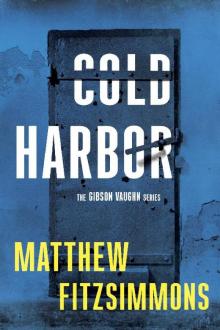 Cold Harbor
Cold Harbor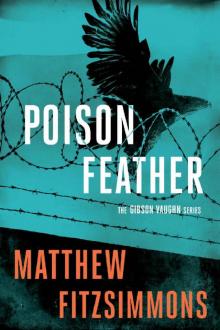 Poisonfeather (The Gibson Vaughn Series Book 2)
Poisonfeather (The Gibson Vaughn Series Book 2)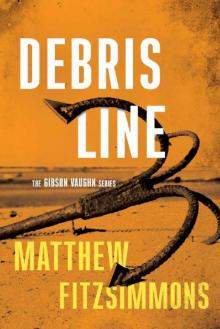 Debris Line (Gibson Vaughn)
Debris Line (Gibson Vaughn)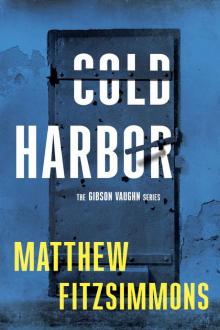 Cold Harbor (The Gibson Vaughn Series Book 3)
Cold Harbor (The Gibson Vaughn Series Book 3)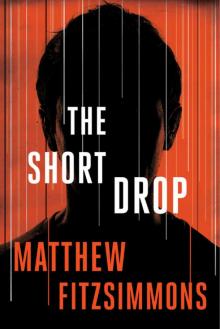 The Short Drop
The Short Drop